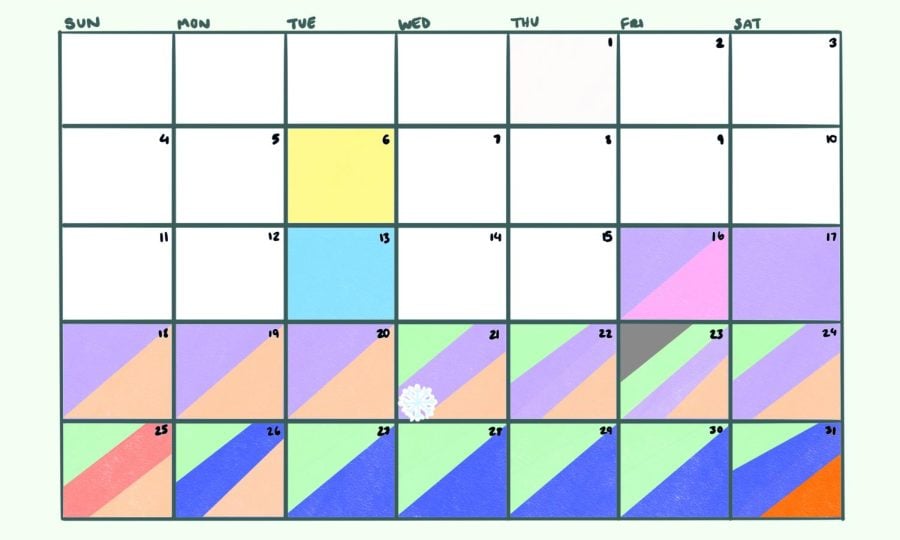Christmas, Hanukkah and… Festivus? There’s more to December holidays than you might think
Daily file Illustration by Olivia Abeyta
There are more Holidays in December than just Christmas and Hanukkah.
December 1, 2022
There’s more to December than Christmas and Hanukkah: check out these holidays that take place throughout the season.
Nicholas Day
Christians across the world commemorate St. Nicholas Day on Dec. 6 to honor St. Nicholas for his charity. A fourth-century bishop from present-day Turkey, St. Nicholas was known for giving away all of his inherited wealth to the poor, and his feast day is often observed by gift giving. It was Dutch immigrants’ usage of his nickname, Sinterklaas, in the U.S. during the 1600s that eventually linked St. Nicholas to the present-day image of Santa Claus.
Lucia’s Day
St. Lucia’s Day, celebrated this year on Dec. 13, commemorates the early fourth-century young woman who wore a wreath of lit candles to guide her as she secretly brought food to Christians hiding in Roman catacombs. The holiday, also called “St. Lucy’s Day,” is integral to Scandinavian and Swedish cultures and includes a procession of candle bearers and gingerbread biscuits.
Las Posadas
Las Posadas is a religious festival commemorating the journey of Joseph and Mary, the parents of Jesus Christ, from Nazareth to Bethlehem. The couple sought safe refuge for Mary to give birth and were forced to shelter in a stable for animals. Las Posadas is celebrated in Mexico and the U.S. and lasts from Dec. 16 to 24. During the festival, small children lead processions through each town while dressed in silver and gold robes, and images of Mary and Joseph riding a donkey are displayed.
Day of Reconciliation
South Africa observes the Day of Reconciliation, a celebration of national unity, on Dec. 16. Two significant events in the country’s history occurred on that date. Originally, the date commemorated the nation’s European-descended Voortrekker people defeating the Zulus in the 1838 Battle of Blood River. The date took on greater meaning 123 years later when the African National Congress formed its military wing, Umkhonto we Sizwe, on Dec. 16, 1961 to begin an armed uprising against South Africa’s apartheid government.
Hanukkah
Hanukkah, also spelled Chanukah, Chanukkah or Hanukka, is the Jewish holiday celebrating the Maccabees’ unexpected victory over their rivals and the rededication of the Second Temple in Jerusalem. During the Maccabees’ fight, the candles in the temple burned miraculously for eight days, outlasting the expected length of one day given little oil. The lighting of the menorah throughout the holiday commemorates this event.The holiday is celebrated over eight days, beginning on sundown this year on Dec. 18. During Hanukkah, Jewish people play games with dreidels for chocolate gelt and eat oil-fried foods including latkes.
Yule
Yule is the pagan festival of rebirth that starts with the winter solstice on Dec. 21 and ends with the start of the new year.. Dating as far back as the fifth century, the Germanic pagans were the first to celebrate Yule by sacrificing animals, offering mistletoe and lighting Yule logs to ward off evil. Today, the celebration of the Sun’s return is observed by Wiccans and neo-pagan practitioners.
Winter Solstice
The winter solstice, celebrated this year on Dec. 21, is the shortest day of the year in the Northern Hemisphere because Earth is tilted the furthest from the sun. There will be just under nine hours and seven minutes of daylight on the solstice, and daylight will gradually increase until the summer solstice on June 21. The event is culturally celebrated across the world, including in China, Iran, Scandinavia and Native American communities.
Festivus
What started as a joke from a 1997 episode of the popular American sitcom “Seinfeld” has since grown into a genuine occasion for celebration. Festivus, officially observed on Dec. 23 but celebrated by some throughout the month, is a secular and anti-commercialist holiday that eschews a Christmas tree in favor of an aluminum pole and a fancy meatloaf dinner. Traditions include an “Airing of Grievances” with friends and family as well as a “Feats of Strength” wrestling competition against the head of the family.
Christmas
Christmas, which traditionally occurs Dec. 25, has been regularly celebrated since 336 C.E. The holiday gained popularity during the Middle Ages, when it spread outside of Rome. Christmas honors the birth of Jesus, also known as Jesus Christ or Jesus of Nazareth, who many Christians recognize as the son of God and the Messiah anticipated in the Hebrew Bible. On the holiday, many families practice gift-giving and engage in religious worship.
Kwanzaa
Kwanzaa is a celebration of African-American culture that begins on Dec. 26 and typically ends on Jan. 1, with a communal feast called Karamu occurring the day before. Activist Maulana Karenga first celebrated the holiday in 1966, basing it off of traditional harvest festival traditions that originated in Southern Africa. Karenga said she wanted to give Black people an opportunity to celebrate their history. The celebration is centered around seven principles, including unity, self-determination and faith, and candles are lit according to the day’s principle.
New Year’s Eve
Dec. 31 marks a worldwide celebration of the close of one year and the start of a new one. The holiday follows the Gregorian calendar year, and nowadays conjures thoughts of ball drops, “Auld Lang Syne” and champagne — well, for everybody except CNN. But end-of-year traditions also date back to ancient civilizations. The Babylonians observed the New Year in March with an 11-day festival, and Julius Caesar moved the eve back to Dec. 31 when he introduced the Julian calendar, of which a modified version is used today.
Related Stories:
— Students and faculty express frustration over lack of class cancellations on Jewish High Holidays
— Captured: Evanston, Northwestern decorate just in time for the holidays












